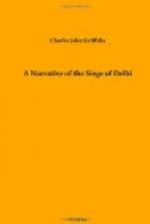The portions of the town we passed through on that day had been pillaged to the fullest extent. Not content with ransacking the interior of each house, the soldiers had broken up every article of furniture, and with wanton destruction had thrown everything portable out of the windows. Each street was filled with a mass of debris consisting of household effects of every kind, all lying in inextricable confusion one on top of the other, forming barricades—from end to end of a street—many feet high. We entered several of the large houses belonging to the wealthier class of natives, and found every one in the same condition, turned inside out, their ornaments torn to pieces, costly articles, too heavy to remove, battered into fragments, and a general air of desolation pervading each building. Much of this wholesale destruction was, no doubt, attributable to the action of the sepoys and rabble of the city, who during the siege, and in the state of anarchy which prevailed during that period, had looted to their hearts’ content, levying blackmail on the richer inhabitants and pursuing their evil course without let or hindrance. Still, that which had escaped the plundering and devastating hands of the sepoys was most effectually ruined by our men. Not a single house or building remained intact, and the damage done must have amounted to thousands of pounds.
We were quite alone in most streets; deserted and silent, they resembled a city of the dead on which some awful catastrophe had fallen. It was difficult to realize that we were passing through what had been, only a few days before, the abode of thousands of people. What had become of them, and by what magic influence had all disappeared? Not till days afterwards was the mystery solved.
The tai-khanas, or underground rooms of houses, scattered all over the city, were found to be filled with human beings—those who, by age or infirmity, had been unable to join in the general exodus which had taken place during the last days of the siege. Hundreds of old men, women and children, were found huddled together, half starved, in these places, the most wretched-looking objects I ever saw. There was no means of feeding them in the city, where their presence also would have raised a plague and many would have died; so, by the orders of the General, they were turned out of the gates of Delhi and escorted into the country. It was a melancholy sight, seeing them trooping out of the town, hundreds passing through the Lahore Gate every day for a whole week. We were told that provisions had been collected for their use at a place some miles distant, and it is to be hoped the poor creatures were saved from starvation; but we had our doubts on the subject, and, knowing how callous with regard to human suffering the authorities had become, I fear that many perished from want and exposure.




